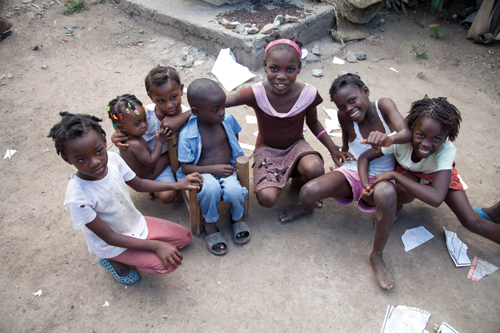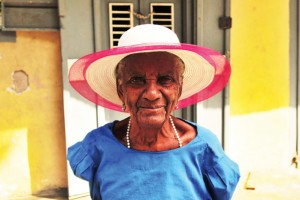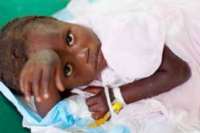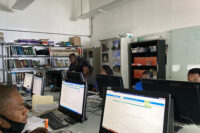2013: The Year of the Woman.
In the westernized world, women galvanize their gains forged over the past 100 years. Many congressional seats and governors’ mansions now have female occupants. Women marched into the ranks of most professions, if not with across the board equal pay, at least well positioned for exerting their experience and influence. Women’s voices command attention as they urge for social, medical and economic policies which include the particularities of women’s lives. While in Haiti, the woman’s story plays out like a reset to the 1800s.
 Many US business women idolize CEOs Beth Mooney of KeyCorp, Ursula Burns of Xerox and Ellen Kullman of DuPont and work to achieve similar multimillion dollar compensation packages for themselves. The Haitian women’s sights fall lower than concern over stock growth and returns on equity. Many Haitian women lack ready access to feminine hygiene products, and may be confronted with choosing between this basic commodity or purchasing food if she does find them. No monogrammed silver cups and Gund teddy bears accumulate in wait of her infant’s birth. Many Haitian babies and toddlers never know the feel of a commercially produced diaper; they relieve themselves on the ground and get a quick wash off, if they are lucky, from a hose.
Many US business women idolize CEOs Beth Mooney of KeyCorp, Ursula Burns of Xerox and Ellen Kullman of DuPont and work to achieve similar multimillion dollar compensation packages for themselves. The Haitian women’s sights fall lower than concern over stock growth and returns on equity. Many Haitian women lack ready access to feminine hygiene products, and may be confronted with choosing between this basic commodity or purchasing food if she does find them. No monogrammed silver cups and Gund teddy bears accumulate in wait of her infant’s birth. Many Haitian babies and toddlers never know the feel of a commercially produced diaper; they relieve themselves on the ground and get a quick wash off, if they are lucky, from a hose.
The plight of a Haitian woman revolves around putting a meager amount of food in her stomach at least once a day. Feeding the family can often mean letting a combination of mud, salt and oil bake in the sun in the shape of cookies and eating them to curb the gnawing hunger. Her feet provide transportation and her Beemer is a pair of matching shoes. A sturdy house with a roof that doesn’t leak, the size of an American kitchen, for her extended family is the Haitian woman’s dream deferred.
 The 2010 earthquake killed twenty-five percent of Haiti’s civil servants reducing woefully inadequate social services even more sharply. An often dysfunctional justice system, the absence of reliable police protection, and an explosion of gender based violence colors the world of Haitian women with constant and real fear. In the absence of competent medical care, a diagnosis of breast, ovarian and even cervical cancer invariably foretells a tortuous death sentence.
The 2010 earthquake killed twenty-five percent of Haiti’s civil servants reducing woefully inadequate social services even more sharply. An often dysfunctional justice system, the absence of reliable police protection, and an explosion of gender based violence colors the world of Haitian women with constant and real fear. In the absence of competent medical care, a diagnosis of breast, ovarian and even cervical cancer invariably foretells a tortuous death sentence.
Living life as a Haitian woman may well be among the most difficult of callings on the planet.
Casting Haitian women into the role of victims however dismisses the very strength of their power; indeed seeing Haitian women as victims takes away their unique and important power. Every day, Haitian women make and own a multitude of choices that often amount to considered compromises. The need for food to get through the day may well outweigh the longer term consequences of dubious personal alliances. Forgoing the expense of healthcare regimes in favor of school tuition for a child is not only the show of motherly compassion, but a form of active resistance against the disparities of present life and a claim for a better future, if not for herself, at least for her children. Singing, laughing and the gracious welcoming of others evidences the incredulous and elegant spirit of the Haitian in the face of unrelenting struggles. This often commented upon spirit also signals just how much a Haitian woman still owns her own life and holds her own power to choose her response in the midst of merciless daily circumstances that would leave most westernized women as crumbled, sob stained heaps on the floor.
Hôpital Sacré Coeur has stood beside, ministered to and learned from Haitian women for more than 26 years. The majority of our patients are women and their children. Women fill a large percentage of employee positions at the hospital and fulfill many of the vendor roles. Clinics, medical and outreach programs address the specific healthcare needs of women: maternity services, a neo-natal unit, vaccination programs, HIV/AIDS services including the prevention of mother-to-child transmission, gynecological services, healthcare education and a policy that insists lack of payment does not mean lack of treatment.
Despite a life overwritten with stamps of shame, disregard and disrespect, when a woman enters Hôpital Sacré Coeur she is treated as a co-participant in her healthcare program and always, always, always with dignity
and respect.
Join us in beating back the darkness in the lives of Haitian women by making a healthy donation to the medical and community programs at Hôpital Sacré Coeur that empower our Haitian sisters.
Blessings!
Joni









